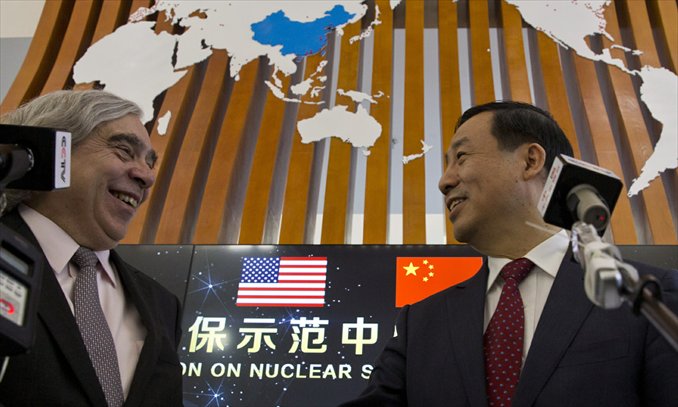Sino-US nuclear center opens
Beijing-based institution will work to prevent terrorism, accidents

Xu Dazhe (right), chair of the China Atomic Energy Authority, shakes hand with US Secretary of Energy Ernest Moniz at the Nuclear Security Center in Beijing on Friday. Photo: AFP
The largest nuclear security center in the Asia-Pacific region, financed by China and the US, opened on Friday in Beijing, which analysts said marked landmark progress in Sino-US cooperation and could help address nuclear proliferation threatened by terrorism.
"China will make full play of the center as a demonstration platform … China has been dedicated to improve the nation's nuclear security level and has been actively promoting international cooperation on nuclear security," Lu Kang, Chinese foreign ministry spokesperson, told a daily briefing on Friday.
Lu noted that preparation for the center started in 2011, and that construction began in October 2013 and was completed a year ahead of schedule in December 2015.
"During this process, China and the US have maintained close cooperation. China appreciates the efforts and contribution made by the US," he said.
The center, constructed by the China Atomic Energy Authority (CAEA) and the US Department of Energy, is capable of training about 2,000 nuclear security staff for China and other Asia-Pacific nations each year, said CAEA chair Xu Dazhe, who is head with the State Administration of Science, Technology and Industry for National Defense (SASTIND).
"The center marks a significant achievement in China-US nuclear security cooperation and will boost cooperation in the Asia-Pacific region and the world," said Wang Yiren, vice chair of the CAEA, adding that it will also promote the peaceful use of nuclear power, the Xinhua News Agency reported.
Security cooperation
According to a SASTIND press release sent to the Global Times on Friday, the center is tasked with international cooperation and exchange on nuclear security and control on nuclear materials as well as nuke export management. Apart from personnel training, it can also offer testing and analysis.
The two nations have also cooperated in other nuclear security areas such as low-enriched reactors, security of radioactive sources and radiation detection by customs authorities, according to Wang.
"Nuclear security has become an increasingly prominent global issue given the international situation threatened by terrorism, as a number of cases have seen terrorists smuggling the materials for dirty bombs," Gui Liming, a professor at Tsinghua University, told the Global Times on Friday.
China and the US agreed at the Nuclear Security Summit held in Washington in 2010 to establish a nuclear security center. Under the agreement, the center, which is located in Fangshan district in Beijing, is run and administered by China, while the US is responsible for providing nuclear-security equipment.
Unlike nuclear safety, which addresses problems such as nuclear accidents and radiation, nuclear security targets deliberate sabotage including the theft of nuclear materials, Liu Yongde, spokesperson of CAEA, told reporters on Wednesday, calling the center as a "landmark achievement" on Sino-US cooperation.
The center is a landmark achievement in Sino-US cooperation and it will play an active role in boosting strategic mutual trust between the two countries, Liu noted.
Sizable contribution
The center's launch came ahead of the Fourth Nuclear Security Summit scheduled on March 31 and April 1 in Washington. Leaders from more than 50 countries and four international organizations are reportedly expected to attend the summit, including Chinese President Xi Jinping, but the Chinese foreign ministry did not confirm Xi's expected attendance.
As the US is home to almost one-fourths of the world's nuclear power plants and China is making rapid development on nuclear energy, the two countries' cooperation will make a great contribution to the world's nuclear safety and security, according to Gui.
Cooperation between China and the US have yielded fruitful achievements in energy and climate change cooperation, Chinese Vice Premier Zhang Gaoli said during a meeting with US Secretary of Energy Ernest Moniz, as both sides called for strengthened cooperation in nuclear energy amid others, Xinhua reported.
The Chinese mainland has 30 operational nuclear power generating units, with a total installed capacity of 28.31 gigawatts. It also has 24 units with a total installed capacity of 26.72 gigawatts under construction, ranking first in the world.
Under the 13th Five-Year Plan (2016-20), China has also vowed to upgrade its capability in nuclear and radiation safety, including strengthening training to cope with nuclear accidents.
As planned, the nation's installed nuclear power capacity will reach 58 gigawatts with an additional 30 gigawatts under construction by 2020.
In January, China published a nuclear white paper assuring the world that China had "the most advanced technology and most stringent standards" to ensure safe and efficient development of nuclear power.